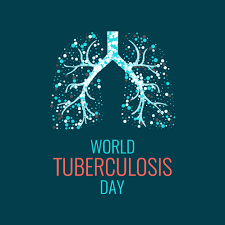There are two TB-related conditions that exist, namely latent TB infection (LTB) and TB disease. If the disease is not treated properly, it can be fatal

World Tuberculosis (TB) Day is observed on March 24 every year to raise awareness about the world's deadliest infectious killer, TB. This year's theme is "Invest to End TB. Save Lives." The day commemorates the date when, in 1882, Dr Robert Koch announced his discovery regarding Mycobacterium tuberculosis, which is the bacillus that causes tuberculosis (TB).
What is Tuberculosis (TB)?
It is a serious infectious disease that mainly affects the lungs and is caused by a bacterium known as Mycobacterium tuberculosis. According to the CDC, the bacteria mainly attacks the lungs, but TB bacteria can attack any part of the body, including the kidney, spine, and brain. Also, not everyone infected with the bacteria that causes TB becomes sick. Tuberculosis bacteria can spread from person to person via tiny droplets released into the air through coughs and sneezes.
There are two TB-related conditions that exist, namely latent TB infection (LTB) and TB disease. If the disease is not treated properly, it can be fatal.
How TB spreads
The bacteria that cause TB spreads from one person to another. When a person coughs, sneezes, speaks, or sings, the bacteria of TB enters the air, and when people nearby breathe, it may enter the body and infect the person. It is a myth that TB is spread via shaking someone's hand, sharing food or drink, touching bed linens or toilet seats, sharing toothbrushes, kissing, etc.
When a person breathes in TB bacteria, the bacteria settle into the lungs and begin to grow. And from there, it moves to other parts of the body through blood. Tuberculosis in the lungs or throat can be contagious. That is, it can spread to other people. But TB in other parts of the body, like the kidneys or spine, is mainly non-infectious. Most likely, people with TB disease spread it to people when they spend time with them every day, and these people may be family members, friends, schoolmates, etc.
Tuberculosis symptoms
Coughing for three or more weeks
Coughing up blood or mucus
Pain in Chest, or pain with breathing or coughing
Unintentional weight loss
Fatigue
Fever
Sweating at night
Chills
No appetite, etc.
Also, TB disease symptoms in other parts of the body depend upon the area that is affected. And people suffering from latent TB infection do not feel sick or do not have any symptoms, so they cannot spread TB to others.
Risk factors
There are certain factors that can increase the risk including;
Weakened immune system
HIV/AIDS
Diabetes
Severe kidney disease
Certain cancers
Cancer treatment, like chemotherapy
Drugs to prevent rejection of transplanted organs
Some drugs that are used to treat rheumatoid arthritis, Crohn's disease, and psoriasis
Malnutrition or low body weight
Very young or advanced age, etc.
Risk of getting infectious increases when a person travels to areas with high tuberculosis rates like; Africa, Asia, Eastern Europe, Russia, and Latin America.
Prevention for TB
If people have latent TB infection and are in high-risk groups, then they should take TB medication. Some measures that can be followed that help family and friends avoid getting sick include:
Stay home
Cover mouth
Ventilate the room
Put on a face mask
It is important to finish the proper medication. But if a person stops treatment early or skips doses, then it is believed that bacteria from TB may have a chance to develop mutations that will allow them to survive the most potent TB drugs. Therefore, the resulting drug-resistant strains are deadlier and may be difficult to treat.
Vaccination
Tuberculosis vaccination is provided to infants in countries where TB is more common. The vaccine is bacille Calmetter-Guerin (BCG). It is not widely used in the United States but is often given to infants and small children in other countries where TB is common. It is also said that BCG does not always protect people from getting TB.